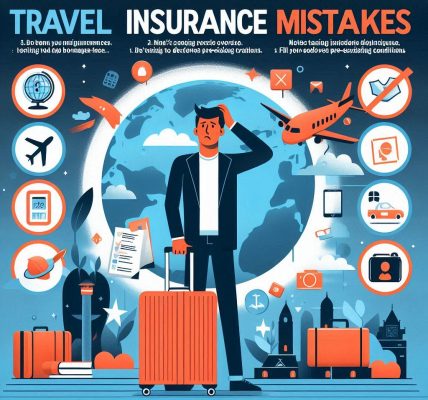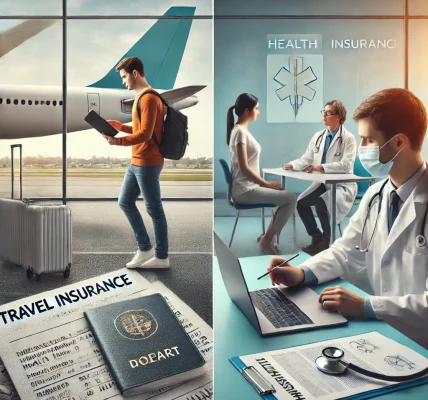Introduction
Traveling can be an exciting and enriching experience, but unforeseen medical emergencies can turn a dream vacation into a nightmare. Whether it’s a minor illness or a serious medical condition requiring hospitalization, dealing with medical issues while abroad can be costly and stressful. This is where travel insurance comes in.
A well-structured travel insurance policy can provide financial protection and necessary assistance during medical emergencies. However, it’s crucial to understand what is covered, what is excluded, and how to choose the right policy. This blog will guide you through everything you need to know about travel insurance and medical emergency coverage to ensure a safe and worry-free trip.
Why Medical Coverage is Essential in Travel Insurance
Medical expenses can be exorbitant in some countries, and without insurance, travelers may have to pay out of pocket. Here’s why medical coverage in travel insurance is crucial:
- High Healthcare Costs: Some destinations, such as the U.S. and Switzerland, have expensive healthcare systems, making medical coverage indispensable.
- Emergency Medical Evacuations: Transporting an injured or ill traveler back home can cost thousands of dollars.
- Peace of Mind: Knowing you have financial protection allows you to travel with confidence.
- Access to Quality Healthcare: Some policies provide access to top-tier hospitals and medical providers.
- Coverage for Unexpected Accidents: Whether it’s food poisoning or a sports injury, travel insurance can help cover medical expenses.
What Medical Emergencies Does Travel Insurance Cover?
While different policies offer varying levels of coverage, most travel insurance plans include the following medical benefits:
1. Emergency Medical Treatment
- Covers hospitalization, doctor visits, prescription medications, and diagnostic tests.
- Includes medical care for unexpected illnesses or injuries during your trip.
2. Emergency Medical Evacuation & Repatriation
- Covers the cost of transporting you to the nearest medical facility if necessary.
- Provides repatriation benefits to transport you back home for further medical treatment.
3. Accident & Injury Coverage
- Covers medical expenses resulting from accidents such as slips, falls, or car crashes.
- May include coverage for dental injuries caused by accidents.
4. Hospital Stay & Surgery Costs
- Pays for room charges, intensive care, and necessary surgeries.
- May cover expenses for follow-up treatments during the trip.
5. Companion Travel Expenses
- Some policies cover the travel and accommodation expenses for a family member to visit you if you’re hospitalized.
6. Pre-Existing Medical Conditions (With Conditions Applied)
- Some policies provide coverage for pre-existing conditions if declared in advance and approved by the insurer.
- Coverage may require a medical waiver or additional premium.
What’s NOT Covered? Common Exclusions in Medical Coverage
Travel insurance policies often have exclusions, so it’s important to read the fine print. Some common exclusions include:
- Pre-Existing Medical Conditions (Unless Covered Specifically): If you have a chronic illness and it worsens during your trip, it may not be covered unless specified.
- High-Risk Activities & Extreme Sports: Injuries from activities like skydiving, bungee jumping, or scuba diving may require an adventure sports rider.
- Self-Inflicted Injuries or Alcohol/Drug-Related Incidents: If an injury occurs due to intoxication or reckless behavior, your claim may be denied.
- Non-Emergency Treatments: Routine check-ups, cosmetic procedures, and wellness visits are usually excluded.
- Traveling Against Medical Advice: If you travel despite a doctor advising against it, your insurance may not cover related medical expenses.
- Pandemics & Epidemics (Unless Covered by Policy Add-Ons): Some policies may exclude coverage for COVID-19 or other outbreaks unless explicitly included.
How to Choose the Best Travel Insurance with Medical Coverage
1. Assess Your Needs Based on Destination & Activities
- Check the healthcare costs of your destination.
- If you plan to engage in adventure sports, ensure your policy covers related injuries.
2. Look for Adequate Coverage Limits
- Choose a policy with at least $100,000 in medical coverage.
- If traveling to expensive medical destinations like the U.S., opt for coverage of $500,000 or more.
3. Check for Pre-Existing Condition Coverage
- If you have a chronic condition, look for policies that offer pre-existing condition waivers.
- Declare any conditions upfront to avoid claim denials.
4. Review Emergency Evacuation & Repatriation Benefits
- Medical evacuations can be costly, so ensure your policy covers at least $250,000.
- Look for repatriation benefits to cover transportation back home if medically necessary.
5. Understand the Claims Process
- Choose an insurer with a simple and fast claims process.
- Ensure they offer 24/7 customer assistance for emergencies.
6. Compare Policies & Read Reviews
- Compare coverage, exclusions, and customer reviews before purchasing.
- Look for a provider with a strong track record of claim approvals.
Steps to Take During a Medical Emergency While Traveling
If you experience a medical emergency abroad, follow these steps:
- Seek Immediate Medical Attention: Go to the nearest hospital or clinic.
- Contact Your Insurance Provider: Inform them about your condition and get pre-approval for treatments if required.
- Keep All Medical Receipts & Reports: Documentation is necessary for claims processing.
- Follow Up on the Claims Process: Submit all required documents and stay in touch with your insurer for updates.
Conclusion
Travel insurance with medical emergency coverage is a crucial safety net for any traveler. While no one expects to fall ill or get injured during a trip, having the right insurance ensures you receive quality medical care without facing financial burdens.
Before purchasing a policy, carefully review the coverage, exclusions, and claim procedures. Choose a plan that best suits your travel needs and destination. By investing in comprehensive travel insurance, you can embark on your journey with peace of mind, knowing you are protected against medical emergencies.




